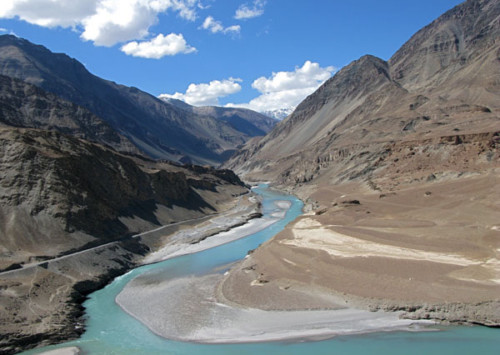Indus Waters Treaty back in spotlight as World Bank intervenes
Biz@India
Following Pakistan’s objections over two hydropower projects in the Indian state of Jammu and Kashmir, the World Bank has appointed a neutral expert and has also formed a Court of Arbitration for resolving the dispute; India slams the decision and Pakistan’s objections.
The World Bank has decided to set up a Court of Arbitration and appoint a neutral expert to deal with Pakistan’s complaint against India over Kishenganga and Ratle hydroelectric projects in Jammu and Kashmir.
Pakistan fears that the two hydroelectricity projects will have it facing an adverse effect on the flow of waters from the rivers under the Indus Waters Treaty.
The Indus Waters Treaty, that was signed by India’s first Prime Minister Jawaharlal Nehru with the then President of Pakistan, Ayub Khan, in 1960, has previously also seen rows between the two countries. The treaty fairly distributes water from Indian rivers including Beas, Ravi, Sutlej, Indus, Chenab and Jhelum between the two counties and is considered to be one of the most successful water sharing endeavours in the world today.
This “inexplicable” decision of the World Bank has seen a rather exceptional stance from India. The Indian government said that it was surprised at the World Bank’s decision to appoint a neutral expert as asked for, while simultaneously establishing a Court of Arbitration as asked by Pakistan.
Stating that both steps together are “legally untenable”, foreign ministry spokesperson Vikas Swarup said, “Inexplicably, the World Bank has decided to continue to proceed with these two parallel mechanisms simultaneously.”
But the government would examine further options and take steps accordingly, he said.
The treaty was signed between India, Pakistan and also the World Bank and has World Bank’s role specified in the role of settling differences and disputes.
Following the course of the treaty, India had asked the World Bank to appoint a neutral expert to resolve the differences of a technical nature which are within the domain of a neutral technical expert. India said that these problems can be resolved by the bilateral Permanent Indus Commission (PIC). Once issues beyond technical differences (if any) are identified, the setting up of a Court of Arbitration would be a logical next step.
“The World Bank has decided to proceed with both steps simultaneously. It was pointed by the government to the World Bank that the pursuit of two parallel difference/dispute resolution mechanisms – appointment of a neutral expert and establishment of a Court of Arbitration – at the same time is legally untenable,” Swarup said.
Pakistan objected over the design of the hydel project in J&K, pointing out that it is not in accordance with the criteria laid down under the Indus Waters Treaty between the two countries.
Earlier, In 2013 Pakistan had lost its case in the Court Of Arbitration on its objection of the Kishenganga project being built in a way which would lead to diversion of water in the tributary of the river. This objection was overruled.










